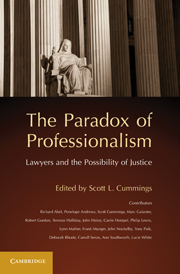Book contents
- Frontmatter
- Contents
- List of Tables and Figures
- Contributors
- Preface and Acknowledgments
- 1 Introduction
- PART I LAWYERS AND THE PUBLIC GOOD: THE FUNDAMENTAL DILEMMA
- PART II LAWYERS AND THEIR CLIENTS: DETERMINANTS OF ETHICAL PRACTICE
- 6 How and Why Do Lawyers Misbehave?
- 7 Aspects of Professionalism
- 8 Professional Regulation and Public Service
- 9 An Innovative Approach to Legal Education
- PART III LAWYERS AND SOCIAL CHANGE: MOBILIZING LAW FOR JUSTICE
- 14 Epilogue
- Index
- References
7 - Aspects of Professionalism
Constructing the Lawyer-Client Relationship
Published online by Cambridge University Press: 05 June 2012
- Frontmatter
- Contents
- List of Tables and Figures
- Contributors
- Preface and Acknowledgments
- 1 Introduction
- PART I LAWYERS AND THE PUBLIC GOOD: THE FUNDAMENTAL DILEMMA
- PART II LAWYERS AND THEIR CLIENTS: DETERMINANTS OF ETHICAL PRACTICE
- 6 How and Why Do Lawyers Misbehave?
- 7 Aspects of Professionalism
- 8 Professional Regulation and Public Service
- 9 An Innovative Approach to Legal Education
- PART III LAWYERS AND SOCIAL CHANGE: MOBILIZING LAW FOR JUSTICE
- 14 Epilogue
- Index
- References
Summary
INTRODUCTION
In policy discussions, professionalism has usually been considered in general terms as a quality, value, ideology, or state of affairs applying to or based in the whole of a particular profession. Sociolegal and empirical work on the topic, however, has tended to focus more narrowly and to explore the ways in which particular working contexts are associated with different professional ideologies and approaches to practice. Nevertheless, work on “arenas of professionalism,” which categorizes areas in which ideologies are developed and compete, has picked out as significant “arenas” the institutions of the profession as a whole as well as the locally situated “workplace.” Similarly, work on the origins of professional behavior has found them within the institutions of the legal profession as a whole, including “general professional identities, formal training and rules of conduct,” and also elsewhere in lawyers' economic incentives, their personal identities and values, and the organizational and practice contexts within which they work.
This chapter focuses on the workplace, though it follows the view that the factors shaping workplace behavior and ideology may lie outside it. Although the significance of the context in which lawyers work for their sense of ethical obligations and what is permissible was demonstrated in the 1960s and made very clear in the work of Landon on small-town practice in the 1980s, the concept of a “workplace” was not clearly articulated until the work of Abbott, who recognized it as one of the three sites in which professions competed for “jurisdiction.”
- Type
- Chapter
- Information
- The Paradox of ProfessionalismLawyers and the Possibility of Justice, pp. 132 - 152Publisher: Cambridge University PressPrint publication year: 2011



